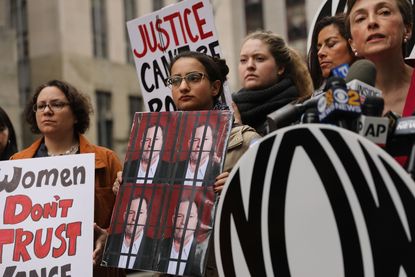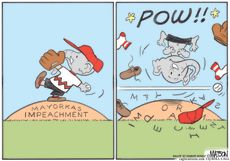The 'Harvey Effect' is changing how we talk about sexual assault
The Harvey Weinstein revelations — and their ripple effect — are paving the way for a revolution


It is like a rolling cavalcade, like God slamming his fist on the table of the Earth and pieces tumbling to and fro. The journalistic exposés on Harvey Weinstein's alleged sexual harassment have emboldened many people to share their stories, and not just people in Hollywood. The so-called "Harvey Effect" — people daring to speak out against powerful men who serially harass or abuse others — has toppled careers in Hollywood, in the media, in Silicon Valley, and even in the British Parliament.
I can't tell you how pleased I am by this. Few things are more disgusting than sexual abuse and harassment. Using power and fame to conceal it and perpetrate more of it only compounds the disgust. The revelations have a salutary effect. They show what every keen observer of humanity knows: that underneath the veneer, much of human life is woven through with cruelty and malice. The truth shall set you free, sayeth Scripture, and amen to that.
There are some, though, who, while rightly condemning sexual harassment, nevertheless fear unintended consequences of the Harvey Effect. They fear the rise of a mob mentality. They're afraid that relentless condemnations will blur the line between outright crime and mere creepiness. Some worry that a "witch-hunt" atmosphere will deter powerful men from mentoring young women, lest they create the wrong impression. These are all legitimate concerns, and they are offered with good intentions.
Subscribe to The Week
Escape your echo chamber. Get the facts behind the news, plus analysis from multiple perspectives.

Sign up for The Week's Free Newsletters
From our morning news briefing to a weekly Good News Newsletter, get the best of The Week delivered directly to your inbox.
From our morning news briefing to a weekly Good News Newsletter, get the best of The Week delivered directly to your inbox.
Still, to all that I say: humbug!
One very good outcome of the Harvey Effect has been the revelation that predatory sexual behavior can happen in any milieu, in any context, and that it tends to be especially present when people can use power and prestige to get away with it and conceal it. Indeed, too many victims are silenced by fear and gaslighting. But they should speak out! Let them speak out!
Some of my more conservative friends roll their eyes when progressives counter the idea that a hyper-vigilance around harassment will cause innocent actions to be misconstrued, but on this one I give the point to progressives. It's actually easy to not harass women, you see, and it's actually easy to not be a creep. I live in France, where the boundary between acceptable and non-acceptable behavior is a little more blurry than in the United States, and you can still tell the creeps from the non-creeps.
When you are in a position of responsibility, it is incumbent upon you, not only to behave, but to avoid even the appearance of misbehavior. Leaders are scrutinized, and they must pay attention not only to what they do but to how it looks and will be interpreted by others. That aspect of leadership was not invented by the PC police, it is inherent to the thing. It is hard. Leadership is hard! But since monarchy is pretty much a thing of the past, there's a very good solution: If you think being a leader is too hard, go do something else.
Will there be false accusations and will there be excessive lynch mobs? Probably. But serial sexual aggressors in positions of prominence going unpunished is a much, much more serious problem.
The Harvey Effect has also complicated easy political narratives around sex, and that's a good thing. Some conservatives like to say that the sexual revolution, by removing so many boundaries, has set predators loose, and some progressives believed once a patriarchal culture was removed, then predation would go, too. We now know the reality is much more complicated.
The persistence and protean nature of male creepiness might be a spur to a tiny alliance in the midst of the endless culture war; whatever their differences, and their different metaphysical justifications, progressive feminists and social conservatives at least very much agree that male sexual predation is wrong. Both sides should see this moment as an opportunity to build bridges and fight a common battle against disgusting enemies who need to see their comeuppance.
Create an account with the same email registered to your subscription to unlock access.
Sign up for Today's Best Articles in your inbox
A free daily email with the biggest news stories of the day – and the best features from TheWeek.com
Pascal-Emmanuel Gobry is a writer and fellow at the Ethics and Public Policy Center. His writing has appeared at Forbes, The Atlantic, First Things, Commentary Magazine, The Daily Beast, The Federalist, Quartz, and other places. He lives in Paris with his beloved wife and daughter.
-
 'A speaker courageous enough to stand up to the extremists in his own party'
'A speaker courageous enough to stand up to the extremists in his own party'Instant Opinion Opinion, comment and editorials of the day
By Harold Maass, The Week US Published
-
 How could the Supreme Court's Fischer v. US case impact the other Jan 6. trials including Trump's?
How could the Supreme Court's Fischer v. US case impact the other Jan 6. trials including Trump's?Today's Big Question A former Pennsylvania cop might hold the key to a major upheaval in how the courts treat the Capitol riot — and its alleged instigator
By Rafi Schwartz, The Week US Published
-
 Today's political cartoons - April 18, 2024
Today's political cartoons - April 18, 2024Cartoons Thursday's cartoons - impeachment Peanuts, record-breaking temperatures, and more
By The Week US Published
-
 Late night hosts lightly try to square the GOP's Liz Cheney purge with its avowed hatred of 'cancel culture'
Late night hosts lightly try to square the GOP's Liz Cheney purge with its avowed hatred of 'cancel culture'Speed Read
By Peter Weber Last updated
-
 Late night hosts survey the creative ways America is encouraging COVID-19 vaccinations, cure 'Foxitis'
Late night hosts survey the creative ways America is encouraging COVID-19 vaccinations, cure 'Foxitis'Speed Read
By Peter Weber Published
-
 The Daily Show's Trevor Noah carefully steps through the Israel-Palestine minefield to an 'honest question'
The Daily Show's Trevor Noah carefully steps through the Israel-Palestine minefield to an 'honest question'Speed Read
By Peter Weber Last updated
-
 Late night hosts roast Medina Spirit's juicing scandal, 'cancel culture,' and Trump calling a horse a 'junky'
Late night hosts roast Medina Spirit's juicing scandal, 'cancel culture,' and Trump calling a horse a 'junky'Speed Read
By Peter Weber Last updated
-
 John Oliver tries to explain Black hair to fellow white people
John Oliver tries to explain Black hair to fellow white peopleSpeed Read
By Peter Weber Published
-
 Late night hosts explain the Trump GOP's Liz Cheney purge, mock Caitlyn Jenner's hangar pains
Late night hosts explain the Trump GOP's Liz Cheney purge, mock Caitlyn Jenner's hangar painsSpeed Read
By Peter Weber Published
-
 Late night hosts marvel at that photo of the Bidens and Jimmy and Rosalynn Carter, mark Star Wars Day
Late night hosts marvel at that photo of the Bidens and Jimmy and Rosalynn Carter, mark Star Wars DaySpeed Read
By Peter Weber Published
-
 Late night hosts temper America's new surge of optimism, hit Romney's rough reception, Flynn's Pledge fail
Late night hosts temper America's new surge of optimism, hit Romney's rough reception, Flynn's Pledge failSpeed Read
By Peter Weber Published